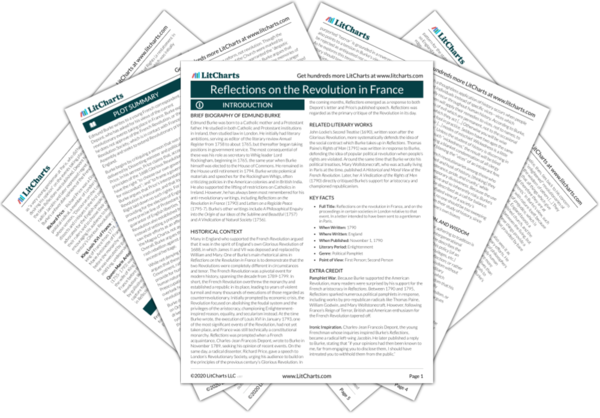Welcome to the LitCharts study guide on Edmund Burke's Reflections on the Revolution in France. Created by the original team behind SparkNotes, LitCharts are the world's best literature guides.
Reflections on the Revolution in France: Introduction
Reflections on the Revolution in France: Plot Summary
Reflections on the Revolution in France: Detailed Summary & Analysis
Reflections on the Revolution in France: Themes
Reflections on the Revolution in France: Quotes
Reflections on the Revolution in France: Characters
Reflections on the Revolution in France: Terms
Reflections on the Revolution in France: Symbols
Reflections on the Revolution in France: Literary Devices
Reflections on the Revolution in France: Theme Wheel
Brief Biography of Edmund Burke

Historical Context of Reflections on the Revolution in France
Other Books Related to Reflections on the Revolution in France
- Full Title: Reflections on the revolution in France, and on the proceedings in certain societies in London relative to that event. In a letter intended to have been sent to a gentleman in Paris.
- When Written: 1790
- Where Written: England
- When Published: November 1, 1790
- Literary Period: Enlightenment
- Genre: Political Pamphlet
- Point of View: First Person; Second Person
Extra Credit for Reflections on the Revolution in France
Pamphlet War. Because Burke supported the American Revolution, many readers were surprised by his support for the French aristocracy in Reflections. Between 1790 and 1795, Reflections sparked numerous political pamphlets in response, including works by pro-republican radicals like Thomas Paine, William Godwin, and Mary Wollstonecraft. However, following France’s Reign of Terror, British and American enthusiasm for the French Revolution tapered off.
Ironic Inspiration. Charles-Jean Francois Depont, the young Frenchman whose inquiries inspired Burke’s Reflections, became a radical left-wing Jacobin. He later published a reply to Burke, stating that “if your opinions had then been known to me, far from engaging you to disclose them, I should have intreated you to withhold them from the public.”







